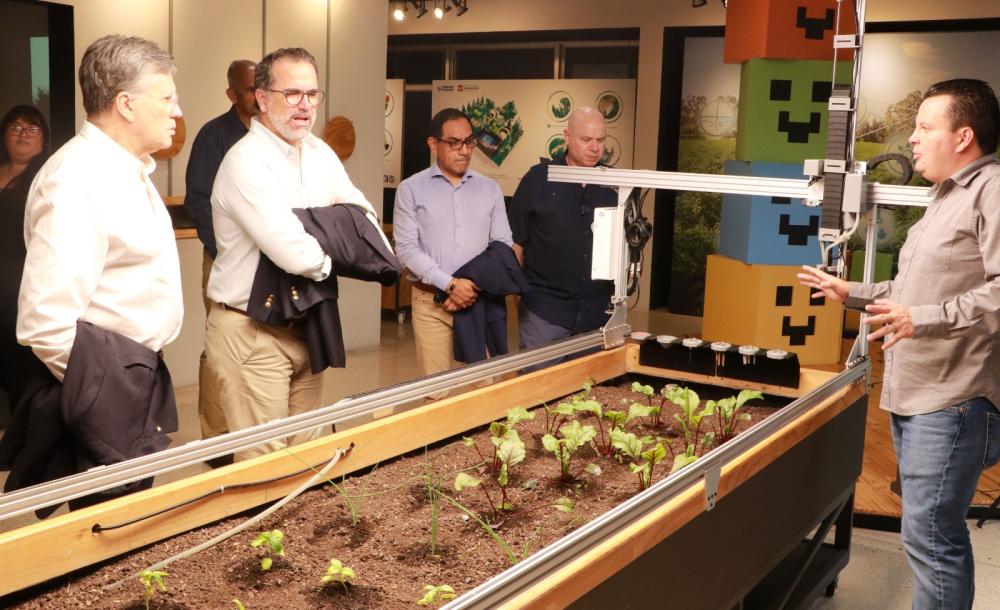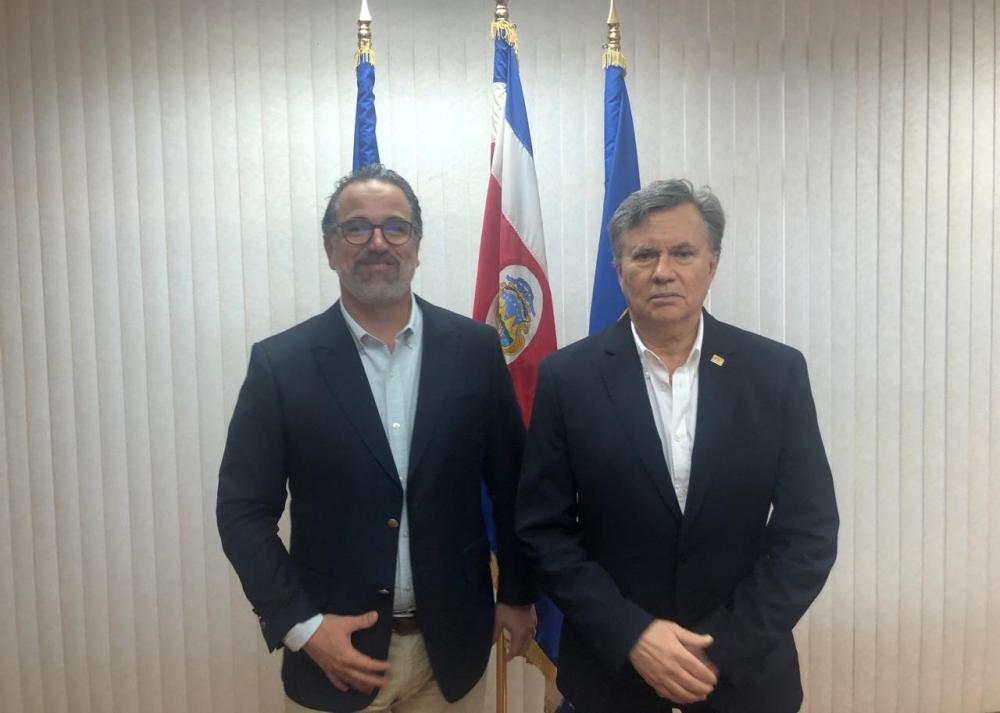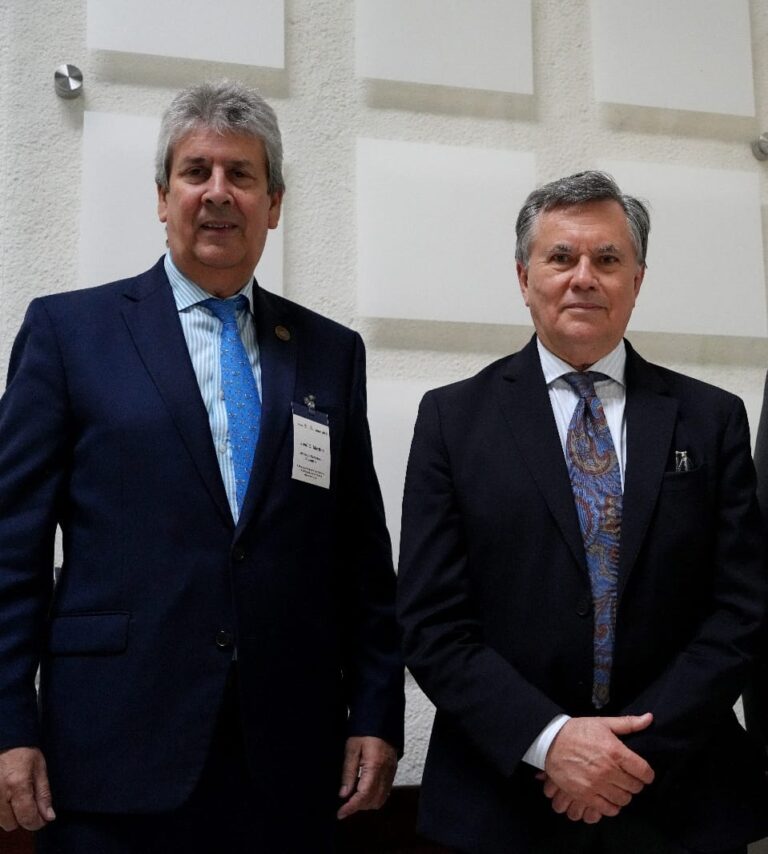Manrique stated that he believes IICA has been “re-founded” to adapt to the modern realities of agriculture and sustainability and that the Institute “has focused on what both young people and farmers need and want today”.

San José, 23 July 2024 (IICA) – Gustavo Manrique, former Foreign Minister and former Minister of Environment of Ecuador, visited the facilities of the Inter-American Institute for Cooperation on Agriculture (IICA) and praised the role the organization is playing in favor of a transformation that promotes more sustainable agriculture, capable of producing more food with fewer natural resources.
“I see that this institution has been re-founded to adapt to modern realities and has focused on what both young people and farmers need and want today”, said Manrique.
“I dare say this should be a mandatory stop for both farmers and non-farmers”, Manrique added after visiting the Interpretive Center for Tomorrow’s Agriculture (CIMAG), located at IICA’s Headquarters in San José, Costa Rica, which seeks to highlight the fundamental role of new technologies in the agriculture sector and their impact on the well-being of families living in rural and urban areas.
The former minister, who defines himself as a person who has dedicated more than 26 years to the sustainability of Ecuador and the planet, stated that “today IICA has pragmatic tools both for those in production and those in the logistics, packaging, or import chain. Here, the learning process is engaging, modern, and of the highest level”.
Debt-for-Nature Swap
As Ecuador’s Minister of Foreign Affairs, Manrique was a central player in the largest debt-for-nature swap in the world, which allowed this South American country to allocate resources for long-term marine conservation in the Galápagos Islands, aiming to promote greater sustainability and improve the quality of life for Ecuadorians.
In this regard, he did not hesitate to affirm that this is a replicable model in other countries in the region.
“I am convinced that all of Latin America is as rich as any wealthy country in the world, with the difference that our currency is called biodiversity. And I mean biodiversity that is alive, not dead, to which value is added and which is later exported”.
Manrique stated that Ecuador kept one of its resources alive, the fish in the Galápagos, by creating a protected marine area.
“We must not forget that Ecuador has the largest fishing fleet in the Eastern Tropical Pacific. Therefore, giving up fishing in a body of water is an act of maturity, which shows an understanding that these resources are worth more alive than dead. There is abundant data that proves it”, he remarked.
At IICA Headquarters, Manrique explained that, with Ecuador’s decision to create a protected marine reserve in the outer waters of the Galápagos, the world reacted by issuing the so-called blue bonds, with the sole purpose of eliminating Ecuador’s old risky debt.
“It was a reduction of sovereign debt of more than $1.1 billion, benefiting 18 million Ecuadorians. Additionally, a donation of more than $450 million over 18 years will be specifically allocated to the conservation of the Galápagos Islands in a perpetual mechanism. The total amount, $1.65 billion, was the largest debt-for-nature swap in the world”, Manrique noted.
The former minister considered that all countries in Latin America and the Caribbean have ecosystem services to restore or protect, which are the heritage of humanity and should be leveraged.
“Countries with more privileged economic positions react with modern financial instruments for the conservation of mangroves, seas, reefs, or migratory species. I invite all countries in the region to look at their biodiversity and think about these new mechanisms. Financial diplomacy for conservation is needed. The debt-for-nature swap is innovative and breaks the paradigm because it is done by not exploiting natural resources”, he said.

Green Award
Manrique is one of the founders of the Green Latin America Award, which recognizes environmental projects with the mission of strengthening them and promoting their continuity over time. IICA is one of the strategic allies of the initiative.
“Today we have a triple planetary crisis due to climate change, biodiversity loss, and pollution. While this affects all countries, there are millions of people wanting to do sustainable agriculture or tourism, but 95% of them fail in the first two years due to a lack of strategic planning, contacts, and financial resources. The Green Latin America Award, a non-profit institution, was born with the intention of shedding light on these projects and generating the necessary capacities to avoid their bankruptcy and so that they can continue doing good for the planet”, he said.
In a decade, there have been 21,000 registered projects, and 71% of them are still alive, revealed Manrique, who renewed the partnership with IICA. The Institute participates in the dissemination and planning of sustainable projects for the award.
Subheading: Manrique stated that he believes IICA has been “re-founded” to adapt to the modern realities of agriculture and sustainability and that the Institute “has focused on what both young people and farmers need and want today”.
More information:
Institutional Communication Division.
comunicacion.institucional@iica.int











